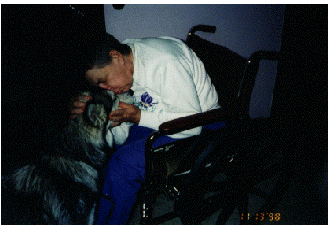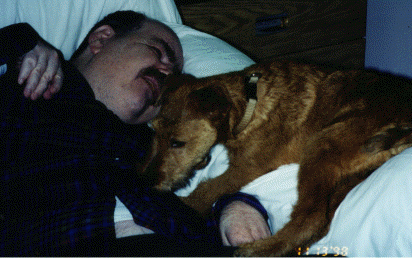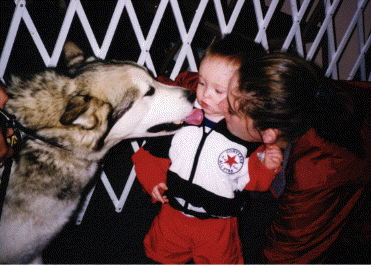PET THERAPY
Pet therapy. No, it's not some exotic new psychological treatment for dogs. Pet therapy is really for people. Imagine life without your dog. Well for many that is a reality. Nursing home residents, hospital patients, people living in group homes, etc. frequently are unable to keep dogs. That is where pet therapy comes in.
Pet therapy is a way to help brighten the day of people who might otherwise not see a dog or, unfortunately, any visitor at all. The benefits of pet therapy are many. Not only can it bring joy to the people visited, but petting a dog can also help to lower blood pressure, relieve stress and help alleviate depression.
 Any dog is a potential therapy dog whether it is a pure bred dog or a mixed breed. Size is also unimportant. I have four dogs who all do pet therapy. They range in size from 13 lbs. to 90 lbs. There are some things, however, that all therapy dogs and handlers should do.
Any dog is a potential therapy dog whether it is a pure bred dog or a mixed breed. Size is also unimportant. I have four dogs who all do pet therapy. They range in size from 13 lbs. to 90 lbs. There are some things, however, that all therapy dogs and handlers should do.
First, if at all possible, you should try to contact one of the organizations that certify therapy dogs. I have some links below that will take you to sites like Therapy Dogs International and the Delta Society.
(Lark and friend at a local nursing home.)
Whether or not you are affiliated with a therapy group, your dog should still have a good understanding of basic obedience. The Canine Good Citizen Test is a great start. If your dog can do well on this, then you are on your way. Remember, nobody wants a wild or uncontrolled dog in their facility. This could actually do more harm than good. So, if you are interested in doing pet therapy, try taking some obedience classes with your dog.
 Besides obedience, you need to know your dog. You should be sure that he or she has a good temperament. At the very least, your dog will need to be good with a variety of people in a variety of situations. Does your dog startle easily, not like loud noises or yelling, is he afraid of canes? These are just some of the things you need to know before ever going to a facility. Be honest with yourself about your dog. Some dogs just do not like pet therapy or simply are not reliable enough to do it. Don't push your dog if he really does not seem suited for therapy. That will only lead to disaster. (Annie and Bruce.)
Besides obedience, you need to know your dog. You should be sure that he or she has a good temperament. At the very least, your dog will need to be good with a variety of people in a variety of situations. Does your dog startle easily, not like loud noises or yelling, is he afraid of canes? These are just some of the things you need to know before ever going to a facility. Be honest with yourself about your dog. Some dogs just do not like pet therapy or simply are not reliable enough to do it. Don't push your dog if he really does not seem suited for therapy. That will only lead to disaster. (Annie and Bruce.)
You will also need to know yourself. How much time can you commit to therapy work? It is important that you not agree to do more than you can realistically handle. If every other Thursday is all the time that you are sure you can spare, that's fine. You will not become too stressed and the people you are visiting will be able to count on you for those regular visits.
In addition to training, your dog will also have to be up to date on all of its vaccinations. Any facility that you regularly visit should be given a current copy of your dog's vaccinations.
 (Driftwood and friend at a local children's health fair.)
(Driftwood and friend at a local children's health fair.)
The above is just a very brief outline of pet therapy. It is not meant to be inclusive. The links at the bottom of the page can give you a lot more information on the ins and outs of getting started in pet therapy.
What I can tell you is that it is very rewarding. My dogs and I go to a variety of facilities. We go to a local nursing home every other week, an adult day center for people with Alzheimers' Disease once a week (I'm allowed to do that on work time!) and once a month to two group homes for people who are developmentally disabled. I think that my dogs and I get as much out of our visits as the people we see. It is a very nice feeling to be able to share the dogs that I love with other people. I hope that those of you who become involved in pet therapy find it as rewarding as we do!
Some links to get you started on pet therapy:
Therapy Dogs International (An organization that certifies dogs.)
The Delta Society
(Another organization that certifies dogs.)
Dog Play (This is a wonderful site for some basic info on pet therapy, lots of links to other pet therapy sites, and some great information on other activities that you can do with your dog.)
Links | Selecting a Breeder | Litter Information | Breed Info | Home | E-Mail Me |
 Any dog is a potential therapy dog whether it is a pure bred dog or a mixed breed. Size is also unimportant. I have four dogs who all do pet therapy. They range in size from 13 lbs. to 90 lbs. There are some things, however, that all therapy dogs and handlers should do.
Any dog is a potential therapy dog whether it is a pure bred dog or a mixed breed. Size is also unimportant. I have four dogs who all do pet therapy. They range in size from 13 lbs. to 90 lbs. There are some things, however, that all therapy dogs and handlers should do. Besides obedience, you need to know your dog. You should be sure that he or she has a good temperament. At the very least, your dog will need to be good with a variety of people in a variety of situations. Does your dog startle easily, not like loud noises or yelling, is he afraid of canes? These are just some of the things you need to know before ever going to a facility. Be honest with yourself about your dog. Some dogs just do not like pet therapy or simply are not reliable enough to do it. Don't push your dog if he really does not seem suited for therapy. That will only lead to disaster. (Annie and Bruce.)
Besides obedience, you need to know your dog. You should be sure that he or she has a good temperament. At the very least, your dog will need to be good with a variety of people in a variety of situations. Does your dog startle easily, not like loud noises or yelling, is he afraid of canes? These are just some of the things you need to know before ever going to a facility. Be honest with yourself about your dog. Some dogs just do not like pet therapy or simply are not reliable enough to do it. Don't push your dog if he really does not seem suited for therapy. That will only lead to disaster. (Annie and Bruce.)  (Driftwood and friend at a local children's health fair.)
(Driftwood and friend at a local children's health fair.)